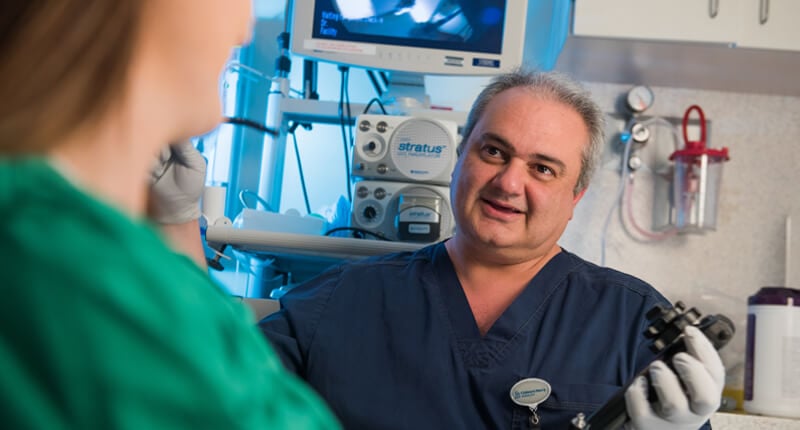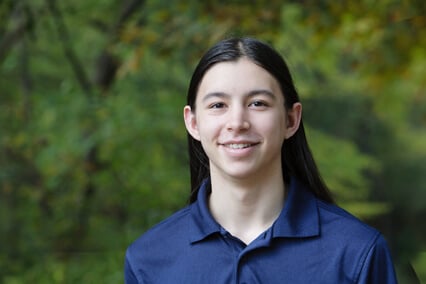Polyposis Center
Nationally ranked by U.S. News & World Report


Polyposis Center
Nationally ranked by U.S. News & World Report


Gastrointestinal polyposis
Polyps—abnormal tissue growths in the large intestine—are relatively common in children and generally do not mean anything in terms of risk of serious illness. However, there is a select subgroup who have several polyps or a suspicious family history that make a hereditary condition with increased cancer risk a possibility. Given how rare these conditions are, many pediatric gastroenterologists seek the help of a multidisciplinary program that includes more specialized gastroenterologists, such as the Polyposis Center at Children’s Mercy.
The Polyposis Center offers highly specialized care for children with gastrointestinal polyposis. We are the only comprehensive, multidisciplinary team in the region with expertise in diagnosing and treating pediatric polyps and related intestinal cancer syndromes.
Our team collaborates extensively with similar national and international centers to remain at the forefront of clinical care, advanced endoscopic procedures, and research in this field.
Our mission
Pediatric hereditary Polyposis Clinic. To offer compassionate, holistic care for children with hereditary polyposis syndromes. We prioritize top-tier medical treatment, holistic well-being, and the advancement of knowledge through groundbreaking research. Our approach is family-centered, providing psychosocial support alongside state-of-the-art medical care. Together, we strive to improve the lives of our patients and their families, fostering health, hope, and resilience on their journey.
Why children with polyps need specialized care
Children, sometimes even very young, can develop a single polyp in the colon by chance. However, children with several polyps, polyps in the rest of the intestine or polyps with unusual characteristics when studied in the lab may have a far more serious condition.
Some children with many polyps may have few or no symptoms but an expert review of their family history leads to a diagnosis of one of several different polyposis syndromes. This has, of course, important consequences. Polyposis syndromes reflect a pattern of developing polyps and also usually a risk of cancer inside and outside the colon.
Oftentimes, these children—with the right testing—are found to have detectable genetic mutations related to their condition. Ideally these children should be seen and treated by a team made up of individuals with a passion for treating these complex conditions. The team needs to include pediatric gastroenterologists, genetic counselors, social workers, psychologists and pediatric surgeons.
Children’s Mercy is committed to providing these resources in a single multidisciplinary clinic, which allows us to make communication and coordination of care for your child as seamless and safe as possible.
Specialized Endoscopic Techniques for Children with Hereditary Polyposis Syndromes
Some children with intestinal polyps may have numerous polyps throughout the large intestine and may need specialized endoscopic procedures to remove the polyps safely and with the least amount of bleeding. Our staff have an established track record including leadership in national and international groups involved in endoscopic resection techniques in the colon as well as other parts of the intestine. Specifically, children with Peutz-Jeghers Syndrome may need an endoscopy that includes most or all the small intestine called a Double Balloon Enteroscopy or DBE. Our group has pioneered the use of DBE as well as integrating DBE with video capsule endoscopy in children as young as 6 years and with small intestinal polyps, we have published our experience showing that the procedure relates to decreased intestinal obstruction and decreased need for surgery in this population.
Your care team
Your care team may include:
- Dr. Thomas Attard, a board-certified gastroenterologist who is internationally recognized for his expertise in treating children with gastrointestinal polyps.
- Caitlin Lawson, MS, CGC, a certified genetic counselor who is a member of the national hereditary polyposis interest group.
- Dr. Michele Maddux, a pediatric psychologist, who provides support to you and your child in coping with the psychological impact of the polyposis disorder and connects you to any needed mental health resources. Please note that you and your child will fill out some forms about yours and your child’s overall emotional and behavioral functioning; Dr. Maddux will review these and address any concerns.
- Nicole Stoecklein, RN, BSN Nursing Coordinator who is available in clinic to provide patients and families with extra support and additional education regarding Polyposis.
- Dr. Shawn St. Peter, a pediatric surgeon with extensive experience in the surgical care of children with polyposis syndromes.
- A dedicated research team that supports our research mission, including offering information and options to our families who are seeking to participate in research trials.
In addition to medical expertise, everyone on the team brings their personal knowledge and passion for helping kids to provide comprehensive care for your child.
Why Children's Mercy—dedicated to you and your family through your journey
We understand that your family may travel very far to meet with us and trust us with the care of your child. We are humbled and energized by that trust. We know full well that even the mere mention of the word “cancer” is the last thing families want to hear.
We want to care for your child as a whole person, being sensitive to the medical, psychological and social impacts of their condition.
We are fully committed to research and cutting-edge care to improve the lives of all children with polyposis syndromes. We network with similarly committed providers nationally and around the world to continually share new ideas and find better treatments.
Our team is dedicated to accompanying your family safely through the journey, seeking solutions and always staying one step ahead.
Conditions
Children’s Mercy has an expert team ready to diagnose and treat all types of polyposis syndromes, including:
- Familial adenomatous polyposis (Gardner syndrome)
- Juvenile polyposis syndrome
- Lynch syndrome
- Peutz-Jeghers syndrome
- PTEN hamartoma syndrome
Peutz-Jeghers syndrome: Toby's story
A rare genetic condition causes polyps to continually form in Toby Nguyen’s intestines. But thanks to the Children’s Mercy Polyposis Center and a unique test called double balloon enteroscopy, it’s under control.

